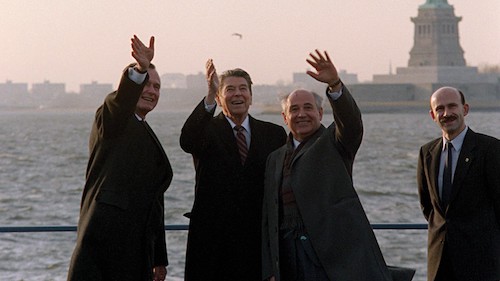The storyteller-in-chief

Love him or hate him, Ronald Reagan was always a storyteller. As an actor, he wasn't especially gifted, but he devoted himself to the schmaltzy stories as best he could. Reagan really found his storytelling gift when he became a politician — when he headed the Screen Actor's Guild and then went on a speaking tour to promote political values. And then, in 1980, he took on the role of a lifetime.
SIFF documentary The Reagan Show is an expertly edited film about President Reagan's storytelling gifts. With no narrator, The Reagan Show is constructed entirely from news clips of the time, footage from Reagan's public appearances, and candid outtakes from the president's recorded messages (the best of which is probably when Reagan frets over the proper pronunciation of "Sununu" for what feels like a too-long time). Using only the evidence in the footage, directors Pacho Velez and Sierra Pettengill craft a portrait of the man that feels surprisingly intimate.
In a little over an hour, Pettengill and Velez track the Reagan presidency in more-or-less chronological order. They pay perhaps too much attention to Reagan's relationship to Gorbachev — some more attention to his domestic failings might have rounded out Reagan's foreign policy triumphalism — but the movie is never anything less than entirely compelling.
Speaking as someone who was too young to pay attention at the time, the thing that surprised me most about The Reagan Show was how in control Reagan seemed. He staged all his events — from the goofy turkey pardons to appearances with foreign leaders — down to the finest detail. JFK may have been our first TV-friendly president, but Reagan was at once the star, the director, and the producer of his own film. The media was outclassed at every opportunity.
Though I'm loath to bring him up, of course The Reagan Show has to take on a different interpretation under President Trump. For as much credit as Trump gets for his ability to manipulate the media, Reagan makes Trump look like an amateur. While Trump whines about unfair coverage and fails to present his physicality as anything but painfully awkward, Reagan understood how he would look at all times. Only toward the end of Reagan's presidency, when Alzheimer's seems to be taking its hold on him and you see some of the luster fade from his eyes and the surety dim from his step, do the comparisons with Trump make sense.
This is the story of how Reagan constructed a persona that was at once fatherly and martial. He made himself out to be both the adorable dad-in-chief and the steel-chested American warrior defending freedom from all the world's many horrors. Even if you detest the man, you'll come away from the documentary with a new respect for his skills.
And there's plenty to detest about Ronald Reagan. The Reagan Show addresses the Iran-Contra scandal head on, but unfortunately it leaves most of Reagan's other controversial policies out of the story entirely. By its nature, carved as it is out of contemporaneous sources, The Reagan Show can't offer too much by way of criticism. The media at the time loved Ronald Reagan even when it hated Ronald Reagan, and it's easy to see why: there's nothing the media loves more than a good story, and Reagan's storytelling was beyond compare.